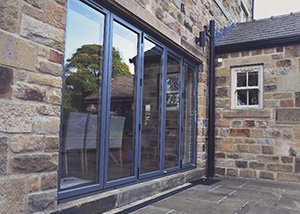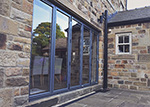Aluminium has been used in engineering and construction for over 100 years, with this metal beginning to be produced on a global scale by the mid-20th century. Aluminium is an incredibly versatile and construction-friendly material that has properties which make it great for construction as well as fixtures such as doors and windows. Here are some of the key benefits of aluminium explaining why it is such a utilised material within the construction industry.
 Diversity
Diversity
Aluminium is one of the most diverse materials available to the trade industry, making it a popular and long-standing product within construction. Due to being light weight, it is easy and cheap to transport to project sites quicker than many other materials, such as steel, as aluminium is a third of the weight of its metal counterpart. Aluminium is nearly three times lighter than iron and allows for quicker construction and completion of projects due to its ease of movement. The strength of aluminium can be adapted with different alloying elements to improve its benefits. This includes better strength and easier formability, making aluminium sheets, poles and other forms of the material attractive to trade workers.
Thermally conductive
Aluminium is a brilliant thermal conductor meaning that, when it is used to build houses or other buildings, it works to retain heat inside the building. This means the need for electrical heating is less than if a less conductive material was used. However the modern aluminium used in construction utilises a polyamide thermal break to create a barrier between the cold outside and warm inside, which is just one of several ways to strengthen aluminium and creates an even stronger barrier-like effect between external and internal temperatures.
Highly durable
It is incredibly durable as it is naturally corrosion resistant and weather-proof, which makes it perfect for holding up buildings, structures and fixtures such as aluminium bi-folding doors and windows for homes. Aluminium building products are made from alloys that are immune to harmful effects of UV rays, which makes them out-perform other construction materials. Due to this durability, aluminium can be reshaped for different purposes like construction projects which require the moulding of the product into different shapes and profiles. For example, wall cladding systems made from aluminium require fewer joints, making it a more time-effective installation.
Environmentally friendly
Aluminium is one of the most sustainable materials in the world. It can be melted down, reshaped and repurposed for new projects, making it 100% recyclable. The recycling process creates high quality aluminium that is not only environmentally friendly due to only using 5% of energy it takes to create primary aluminium, but it means that the material loses none of the physical properties once it has been recycled. This makes it a reliable material for the use of any construction project that requires sustainability without sacrificing durability.
Corrosion resistant
This is a strength for several construction materials, however aluminium naturally generates a protective coating of a thin yet very strong layer of aluminium oxide, making it perfect to use as a protective external material. This protective aluminium oxide layer helps protect the surface of the metal from corrosion over time as well as any extreme weather which would otherwise damage a structure. The natural formation of aluminium also means that it is fire-resistant, making it a brilliant material to be used for doors, windows and wall panels in homes and offices.

